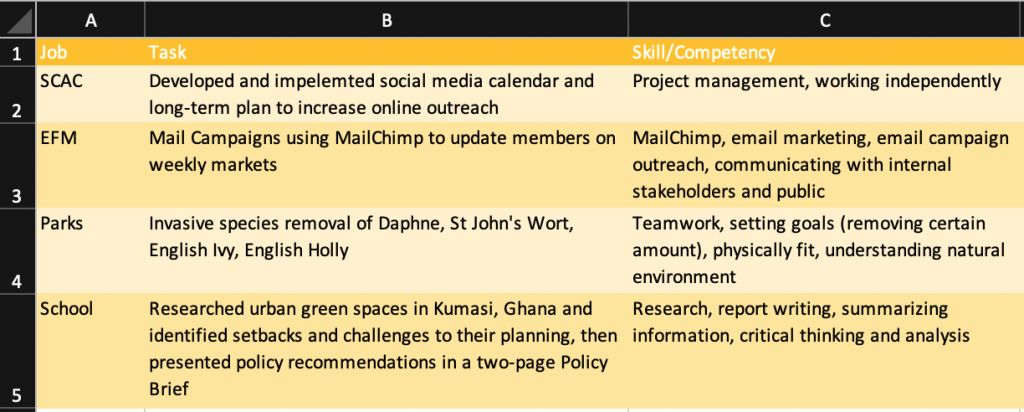Four Tips to Make your Job Search a Breeze
Finding a co-op position or summer job can be a strenuous process. If you’re like me and frantically applying to co-op positions left, right, and centre—while also having to finish last-minute assignments and final papers—finding a co-op position can be a little overwhelming sometimes.
I’ve landed interviews, I’ve missed opportunities, I’ve bombed interviews, and I’ve aced them. From all my trials and tribulations, I’ve developed my own little system for applying for co-op positions (or just jobs in general) that cuts down the time and just makes it easier on myself—and hopefully it will for you too!
1. Have resume templates.
So you don’t have to continuously edit your resume, make a couple different templates targeted at different kinds of jobs to cut down on time. Being a Geography and Professional Communications student, I tend to apply for these two types of jobs, so I have a resume template for each, boasting different sets of skills on them.
For my Geography resume, I present more technical, field-work skills and certifications: self-starter, research, WHIMIS, First Aid, ability to work independently. For my Communications resume, I highlight those skills: social media marketing, excellent public speaker, Adobe Creative Cloud, Microsoft Office.
Then for each job, I quickly tailor these skills to the individual position, instead of having to whip up an entirely new set of skills each time. If you need some tips on writing a great resume, check out this post here and UVic’s resources!
2. Collect references.
Something I struggled with for a long time is asking people to be my reference. I never knew if by doing so I was bothering them, or if they would say no, or if I could only use them for one position. As I’ve come to find out, most professors and job supervisors will gladly help you out and be a reference on your next job search. Just make sure the people you ask know you well and will have positive things to say about you. Let them know you’re on the job hunt and communicate clearly about how you’d like to list them as a reference for more than one position. Communication is always key—and exhibiting great communications skills with your references might even encourage them to let future employers know it’s one of your great skills.
3. Make cover letters easy!
Writing cover letters is probably the most difficult part of applying for jobs or co-ops. To make it easy for yourself to think of ways you’ve demonstrated the skills the position is asking for, you’ll need to sit down for an hour or two and do some critical thinking.
Make a chart, either on a Word or Excel document or on paper, that outlines individual tasks that you have done in past volunteer or job positions and then write how these display your skills. For example, if you worked as a server or busser at a restaurant, you likely worked closely with a team. Zero in on a task you may have done, and outline how you communicated effectively with your team to achieve a collective goal.

I compile my past job tasks and skills into an Excel document so I can easily see each skill and how I’ve displayed it. To make it easy on yourself, continuously add items to this list as you do it, to cut down the time you spend on application items like “Please describe one time where you displayed leadership and what impact it had on those around you.”
Once you have a bunch of items written down, you can pull from this chart when you write cover letters, making it easy for you to see how you’ve demonstrated these skills in the past!
4. Be realistic and think long term.
While a position may look like your dream job, if you don’t meet any of the qualifications, it might not be worth your time to apply. It can also get discouraging if you put a lot of work into your applications and never land any interviews. Apply for a variety of positions—ones you’re super confident you’ll land, ones you’re might be challenged at the interview to get, and ones you might not fit the qualifications, but you think you could be really successful in regardless.

Alright, your future plans might not involve ruling the world, but you’ll need to recognize the role your co-op plays in the bigger picture. It’s just a step on the way to finding your ultimate career path, so don’t get discouraged if you don’t get your dream job as a co-op position right away—your co-op position will help you get your dream job a couple years down the road!
In addition, don’t get hung up on the position wage. If you think it’ll get you some really great experience in your field, but it only pays $12 an hour, think about the long-term positive impacts this great experience will get you. While we all want that high-paying, lavish, $25/hour co-op position, the purpose of co-op is to develop your skills and think about your future career choices.
Set aside some time this week to get your co-op search on track. Don’t be discouraged if you haven’t landed a job yet—sometimes it takes until mid-May to get a co-op position. So, best of luck to you in your co-op search, your summer job search, or your post-grad job search!




